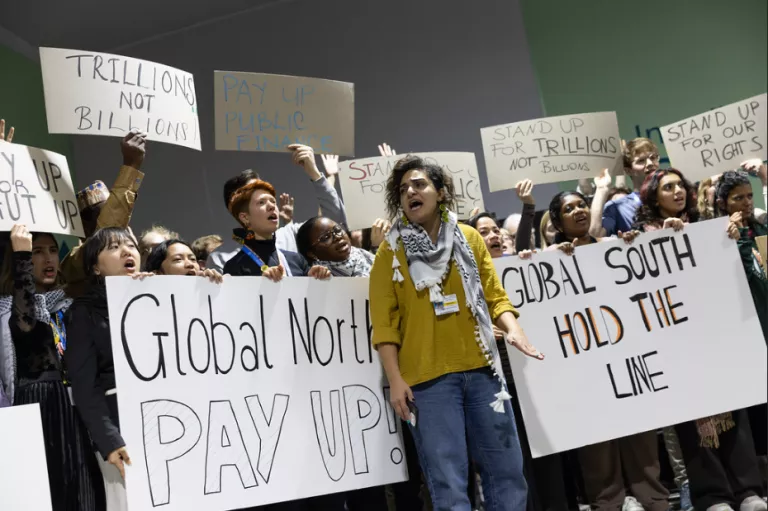
Protesters hold signs while demanding climate justice during COP-29
By Dr. David Hastings, Sierra Club SSJ Executive Committee
While Trump has dominated climate news over the past few weeks, the world’s biggest climate conference, COP29, took place in the petrostate of Azerbaijan.
With leaders from almost 200 countries, the messaging on climate shifted from emphasizing the ethical mandate of doing the right thing, to switching to the economic rewards of climate action. Climate activists from Florida are familiar with this strategy. We know the value that profitable clean energy investments provide; we also know the massive cost of climate disasters, like Hurricanes Helene and Milton, which will cost tens of billions to clean up.
The biggest questions at the COP29 conference include: who pays for climate change? Rich countries, like the U.S. and the EU, are responsible for the 79% of historic emissions, so many believe that they should pay for the climate transition in countries that can’t afford it. Should the fund be $1.3 trillion per year, consistent with UN backed recommendations, or $300 billion per year, which is what the rich nations want? While $1.3 trillion sounds like a huge amount, it’s less than the $7 trillion spent each year on fossil fuels subsidies.
The draft text, just signed as this piece was written, highlights the enormity of the challenge: only $300 billion per year was pledged, and while that is three times more what was pledged before, it is less than a quarter of what is needed. It also ignores poor countries’ calls for grants, not loans, which would put them further into debt.
Finance is the key to help developing nations move from fossil fuels to renewable energy, adapt to climate impacts, and close the energy poverty gap. But nations remain far apart in agreeing on how to pay for the transition to climate.
During the meeting, calls for reform in the climate negotiation process were made. A letter, written by leading scientists and climate experts was published saying that the talks “cannot deliver the change at exponential speed and scale, which is essential … for humanity.” and that the COPs need a “fundamental overhaul.” One of the first recommendations was to change the process of selecting host countries to exclude those that do not embrace the transition away from fossil fuels. Other recommendations include more frequent solution-driven meetings where countries report on progress and “are held accountable in line with the latest science.”
While an agreement was reached, it seems that many are not happy about it. Trying to reach a deal on finance is a huge challenge, especially in the wake of U.S. elections, where a climate denier was elected who will undermine and roll back key climate and clean energy policies.
Written based on reporting from Sierra Club, Inside Climate News, The New York Times and The Guardian